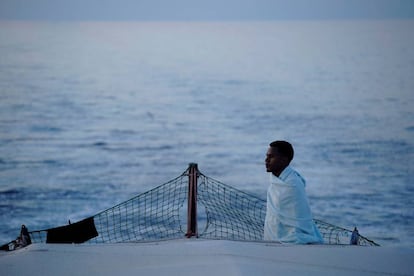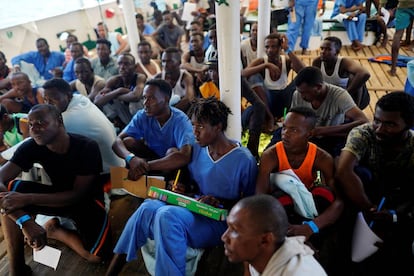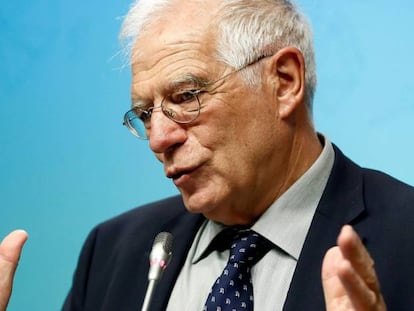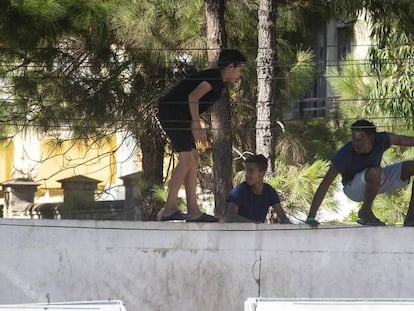Spain: still welcoming rescued migrants, but no more special concessions
The 87 people on board the ‘Open Arms’ will not be offered the same conditions as the ‘Aquarius’


Spain continues to be the only country offering safe harbor to migrants who are rescued in the Mediterranean, but the government has stopped applying the advantageous conditions it offered the Aquarius and other humanitarian aid ships that recently docked at Spanish ports.
The change of criteria has become evident with the upcoming arrival of the Open Arms, which rescued 87 people near the coast of Libya last Thursday. This ship, which is operated by the Catalan group Pro Activa Open Arms, has been offered the port of Algeciras, in southern Spain, as a safe place to dock.
We need a unified protocol that is clear and not arbitrary. It cannot depend on the week’s political agenda
But once on land, the migrants “will follow the protocols established for any migrant arrival,” said government sources.
This is in contrast to the attitude displayed nearly two months ago by Prime Minister Pedro Sánchez, who offered the port of Valencia to the Aquarius – a rescue ship that made world headlines after Italy and Malta denied it permission to dock – and announced that the 630 migrants on board would get a special 45-day residency permit for humanitarian reasons. Sánchez also said that their paperwork would benefit from fast-track processing.
In early July, a similar offer was made to 60 more people rescued by the Open Arms and brought to Barcelona: they were granted a 30-day stay, and their paperwork is getting priority treatment. And on July 21, the Open Arms arrived in Mallorca with the sole survivor of a shipwreck off the Libyan coast.

Faced with a closed-port policy by Italy and Malta and silence from other European countries, Spain offered these exceptional conditions on all three occasions. The EU applauded the humanitarian gesture, but also warned that this is not the way forward.
“Spain has offered one of the best examples of the European spirit in terms of solidarity, “ said EU Immigration Commission Dimitris Avramopoulos in an interview with EL PAÍS last Friday. “I think that Spain reacted in a very positive way. But it cannot go on this way.”
I think that Spain reacted in a very positive way. But it cannot go on this way
Now, just hours before the Open Arms is due to arrive in Algeciras, the government says that the 87 people on board will face the same procedures as other undocumented migrants who are rescued in the Strait of Gibraltar or who make it to Spanish shores on rafts. That is to say, they will spend a maximum of 72 hours at the police precinct and be offered a chance to apply for asylum if they wish to. Eighty-four of the migrants are from conflict zones in Sudan and South Sudan.
And that is not the only change. During earlier rescue operations, the ship’s captain had been informed of his Spanish destination in a matter of hours. This time, the decision has taken four days. The aid organization was also unhappy about the choice, as Algeciras is not the closest port. “Sailing for an additional three days seems completely avoidable to us,” said mission chief Ricardo Gatti.
Government denial
But the Spanish government will not admit to a change of criteria. “The Aquarius was a humanitarian emergency where people’s lives were at risk, and it was necessary to act fast,” said Consuelo Rumí, state secretary for migration. “Now we are at a different juncture. We are oiling a reception protocol that did not exist before.”
Humanitarian groups and immigration lawyers say the government needs to treat everyone equally. “We need a unified protocol that is clear and not arbitrary. It cannot depend on the week’s political agenda,” said Estrella Galán, director general of the aid group Spanish Commission for Refugees (CEAR).
“It is not normal to have different treatment for identical situations, depending on which port people are taken to,” added Noemí Alarcón, vice-president of the Migrations Committee of Abogacía Española, an umbrella group for Spain’s bar associations. “We need a common protocol at all entry points for rescued vessels.”
English version by Susana Urra.









































